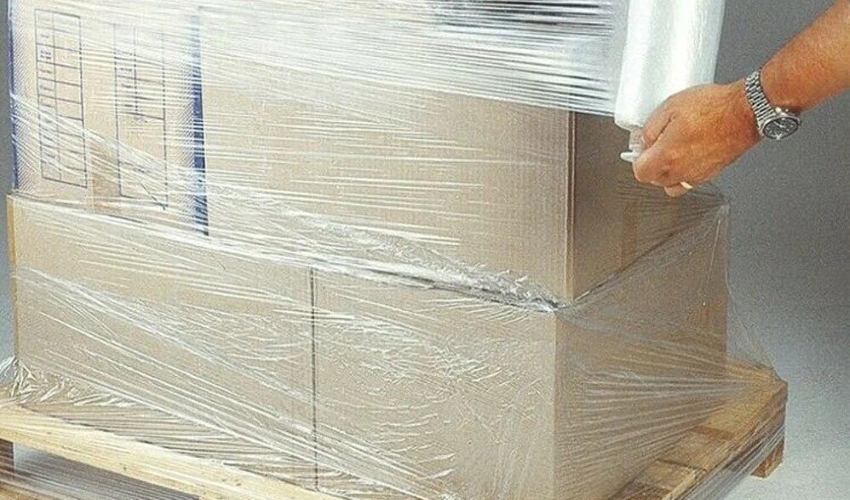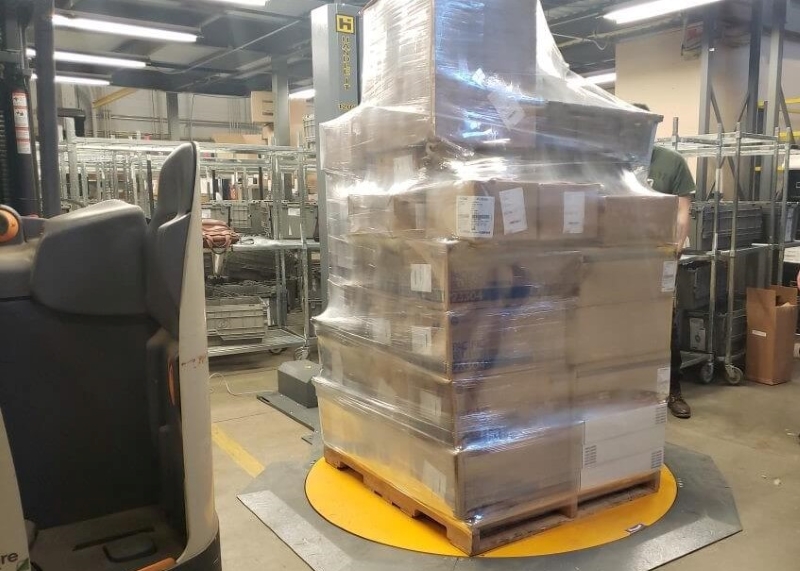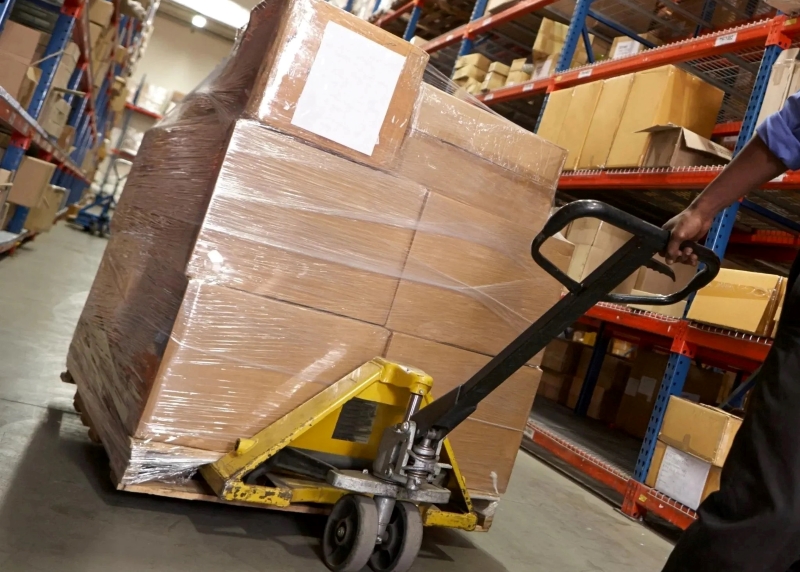
Pallet wrap, also known as stretch film, is a crucial material used in packaging and logistics to secure products on pallets for transport. It provides stability, protects goods from dust and moisture, and minimizes the risk of damage during handling. Pallet wrap comes in various types, including hand and machine stretch films, catering to different packaging needs. For businesses, purchasing wholesale pallet wrap offers a cost-effective solution for bulk packaging needs. By buying in larger quantities, companies can reduce per-unit costs, ensuring they meet their logistical demands efficiently. Wholesale pallet wrap is essential for companies seeking to streamline their operations and maintain consistent packaging standards while benefiting from significant savings. Pallet packaging ensures the safety of goods during transportation, storage and handling, wholesale pallet packaging is cost-saving and efficient.
Users often choose to buy wholesale pallet wrap from pallet wrap wholesalers instead of retail for several reasons, primarily cost-effectiveness and efficiency. Wholesale pallet wrap purchases typically offer lower per-unit prices, allowing businesses to save on packaging expenses, especially when buying in bulk. This is crucial for companies that need large quantities of pallet wrap for consistent operations, such as shipping, storage, and handling.
Additionally, buying wholesale pallet wrap ensures a more streamlined procurement process. Businesses can avoid frequent reordering and benefit from larger shipments that minimize the risk of running out of stock. This can lead to better inventory management and reduce the time spent on restocking.
Moreover, purchasing wholesale pallet wrap allows businesses to maintain a consistent supply of high-quality packaging material. Retail options may offer limited quantities or higher prices, making it less ideal for companies with ongoing or large-scale needs. Thus, wholesale pallet wrap provides both financial and operational advantages, making it the preferred choice for many businesses.

Pallet wrap, often referred to as stretch film, is a thin, flexible film that wraps around items on a pallet, holding them in place and preventing shifting or damage during shipping. The film is typically applied using a stretch wrap machine or manually with a hand-held dispenser. Once wrapped, the film provides a tight, secure seal that helps protect the products from external elements such as dirt, dust, moisture, and UV rays.
When purchasing wholesale pallet wrap, businesses can obtain the film in large quantities, reducing the overall cost per unit. This is especially beneficial for companies with high-volume packaging needs, such as warehouses, distribution centers, and manufacturers.
There are various types of pallet wraps designed to cater to different needs in packaging and logistics. The three most common types are:
The use of wholesale pallet wrap offers a variety of benefits to businesses involved in shipping and storage. Some of the key advantages include:
One specific form of wholesale pallet wrap is wholesale plastic wrap for pallets. This option is widely used for securing various types of products on pallets, including boxes, bags, and industrial materials. The plastic wrap is highly versatile and can be used in both hand and machine applications, offering businesses a range of options to suit their specific packaging needs.
By understanding the different types and benefits of wholesale pallet wrap, businesses can make informed decisions on the best packaging materials for their needs. Whether using hand wraps, machine wraps, or custom solutions, stretch film provides a reliable, cost-effective, and efficient way to secure products during transport and storage.
When searching for wholesale pallet wrap, businesses can choose from a variety of suppliers, both local and online. Each option offers its own set of advantages, from faster delivery times to competitive pricing and tailored services. Understanding where to buy and what to look for in a supplier is key to ensuring you get the best deal on stretch film for your business.
Buying wholesale pallet wrap from local suppliers can provide several benefits, particularly for businesses that require quick delivery or personalized services. Some of the advantages include:
For businesses looking for a wider selection of wholesale pallet wrap, online suppliers are a convenient and often cost-effective choice. Here are some key benefits and popular online suppliers:
Some well-known online suppliers include:
An emerging trend in the stretch film market is the use of wholesale PLA pallet wrap. PLA (Polylactic Acid) is a biodegradable alternative to traditional plastic stretch films, made from renewable resources like cornstarch or sugarcane. It offers an eco-friendly solution for businesses looking to reduce their environmental impact while still benefiting from the protective qualities of stretch film.
By considering both local and online suppliers, businesses can find the best deals on wholesale pallet wrap, whether they prioritize speed, customer service, or sustainability. For those looking to go green, wholesale PLA pallet wrap is a viable and increasingly popular option to explore.
Finding wholesale pallet wrap suppliers near your location is essential for businesses seeking to minimize shipping costs and receive faster delivery. Several strategies can help you locate nearby suppliers, whether through local business directories, industry-specific platforms, or online searches. Here’s how you can find the best pallet wrap wholesale suppliers close to you.

Working with wholesale pallet shrink wrap wholesale near you offers numerous advantages:
To get the best deal on wholesale pallet wrap, it’s important to be proactive when reaching out to suppliers. Here are some tips for contacting them effectively:
By using these methods, you can find local wholesale pallet wrap suppliers who meet your packaging needs efficiently and cost-effectively. Whether you’re looking for bulk discounts, faster delivery, or personalized service, contacting suppliers directly ensures that you get the best possible deal on pallet shrink wrap wholesale.
Stretch wrap packaging is a popular and highly effective solution used across a wide range of industries, including warehousing, distribution, and retail. It involves using wholesale pallet wrap, or stretch film, to secure products and loads onto pallets, ensuring they remain stable and protected during transportation and storage. The growing popularity of stretch film packaging is due to its versatility, efficiency, and cost-effectiveness. Below, we’ll explore why stretch wrap is considered one of the most economical options for businesses.
Stretch film packaging involves wrapping products with a plastic film that stretches to conform to the shape of the items, holding them tightly in place. This method is widely used in industries such as:
The flexibility and affordability of stretch wrap make it an attractive option for companies that need reliable packaging solutions. Wholesale pallet wrap allows businesses to buy in bulk, cutting down costs per unit and ensuring they have an adequate supply of stretch film for their packaging needs.
The widespread adoption of stretch wrap packaging is largely due to the numerous advantages it offers over other packaging methods. Some of the key benefits include:
While stretch wrap is an effective and affordable packaging solution, it’s important to compare it with other commonly used packaging options such as shrink wrap and strapping. Below is a comparison that highlights the benefits and drawbacks of each method:
| Packaging Type | Stretch Wrap | Shrink Wrap | Strapping |
|---|---|---|---|
| Application | Wraps around products, conforms to their shape | Shrinks tightly around the item when heated | Uses tension to secure items with bands or straps |
| Cost | Affordable, especially when bought in bulk | Generally higher cost due to heat application | Moderate cost, with additional equipment needed |
| Ease of Use | Simple to apply manually or with machines | Requires heating equipment for application | Labor-intensive, requires special tools |
| Durability | Strong, flexible, and resistant to punctures | Provides a tight fit, but can be more brittle | Strong, but not as flexible as stretch wrap |
| Protection | Excellent protection from dirt, dust, and moisture | Provides a sealed, tamper-evident barrier | Provides limited protection; mostly for containment |
| Environmental Impact | Can be recyclable or biodegradable (depending on type) | Can be less eco-friendly due to heat usage | Typically made of non-biodegradable materials |
| Speed | Very fast, especially with automated machinery | Slower due to the need for heat application | Slower than stretch wrap, requires manual tensioning |
| Storage Efficiency | Reduces pallet size and improves stacking | Bulkier, takes up more space in storage | Takes up more space and is less efficient for stacking |
As shown in the table, wholesale pallet wrap offers several advantages over shrink wrap and strapping, particularly when it comes to cost-effectiveness, ease of use, and flexibility. While shrink wrap may provide a tighter seal and strapping may be better for heavy-duty loads, stretch wrap stands out as the most efficient and affordable option for general palletizing needs.
Another popular option in the stretch film category is wholesale LLDPE pallet hand use stretch film. LLDPE (Linear Low-Density Polyethylene) stretch film is known for its exceptional stretchability, durability, and resistance to punctures. It’s an ideal choice for businesses looking for a hand-applied wholesale pallet wrap that offers the following benefits:
Stretch wrap packaging, especially wholesale pallet wrap, is a cost-effective and reliable solution for businesses of all sizes. It offers benefits such as labor savings, improved stability, and enhanced protection, making it a preferred choice in the packaging industry. Compared to other options like shrink wrap and strapping, stretch film stands out as the most efficient and economical solution for securing goods.
When it comes to purchasing wholesale pallet wrap, selecting a reliable and reputable supplier or manufacturer is crucial for ensuring you receive high-quality products at competitive prices. A good supplier can make a significant difference in your packaging operations, while a poor one may lead to inefficiencies, increased costs, and potential damage to your goods. Here’s a detailed guide on how to judge whether a pallet wrap supplier or manufacturer is a good one, what conditions they should meet, and what to pay attention to when screening potential suppliers.
The primary factor when selecting a wholesale pallet wrap supplier is the quality of their product. Pallet wrap must be durable, strong, and elastic enough to securely hold items together during transportation and storage. Key characteristics of high-quality pallet wrap include:
Before committing to a supplier, ask for samples and test the product to ensure it meets your quality standards.
Wholesale pallet wrap should provide cost savings compared to retail prices, but the lowest price doesn’t always guarantee the best value. When evaluating the price of wholesale pallet wrap, consider:
Ensure that the supplier’s price is reasonable for the quality offered, and always factor in potential shipping costs and bulk discounts.
A good pallet wrap manufacturer should have sufficient production capacity to meet your needs, whether you’re ordering small or large quantities. Pay attention to:
Ensure that the supplier can meet your order size and deadlines reliably, especially for larger and ongoing orders.
Customer service is a critical aspect of choosing a good wholesale pallet wrap supplier. You should look for a supplier who:
Effective communication and strong customer support are essential for a smooth purchasing process and ongoing relationship.
The reputation of the pallet wrap supplier or manufacturer is a strong indicator of their reliability. To assess a supplier’s reputation:
A supplier with a solid reputation in the industry is more likely to provide high-quality products and customer service.
With growing concerns about environmental impact, many businesses are opting for sustainable packaging solutions. If sustainability is important to your company, look for a pallet wrap manufacturer who:
If your business prioritizes sustainability, ensuring the supplier offers environmentally friendly products will be important.
If your business requires specific types of pallet wrap (e.g., custom colors, branding, or sizes), find a supplier who can accommodate these needs. A good supplier will be flexible in offering:
Customization options can give your business a unique edge, so look for a supplier who offers this service.
Selecting the right wholesale pallet wrap supplier or manufacturer is essential for ensuring you receive high-quality, cost-effective packaging materials. By focusing on product quality, price, production capacity, customer service, reputation, sustainability, and customization options, you can choose a supplier that best meets your needs. A good supplier will help streamline your operations, reduce costs, and ensure your products are securely packaged. Always take the time to research potential suppliers thoroughly, request samples, and evaluate their track record before making a decision.
Pallet wrap is a versatile packaging material used for securing goods during transportation, storage, and handling. When it comes to purchasing pallet wrap, the decision often boils down to buying wholesale or retail. Both options come with their own sets of advantages, disadvantages, and applications.

One of the main benefits of choosing wholesale pallet wrap is cost savings. Bulk purchasing typically offers lower prices per unit, making it an economical option for businesses that require large quantities of pallet wrap for regular use. Additionally, wholesale purchases ensure a consistent supply of packaging material, reducing the risk of running out of stock and minimizing the need for frequent reorders. This is particularly advantageous for businesses with high shipping volumes or those involved in large-scale storage and distribution operations.
However, the downside of buying wholesale is that it requires a larger upfront investment. For smaller businesses or those with limited storage space, purchasing wholesale pallet wrap may lead to excess inventory. Additionally, managing bulk orders can sometimes be more complicated, as it requires more storage capacity and more careful inventory management.
When choosing to buy wholesale pallet wrap, there are several important factors to consider. First, businesses should assess their actual usage needs to ensure they are purchasing an appropriate quantity. It’s essential to have enough storage space to accommodate bulk orders without overcrowding the workspace. Another consideration is the type of pallet wrap being purchased—such as wholesale stretch wrap, black or opaque wrap, or pre-stretched options—to ensure it fits the specific requirements of the goods being packaged.
Retail pallet wrap, on the other hand, is ideal for businesses or individuals with smaller, less frequent packaging needs. Retail options typically offer more flexibility, as they allow for smaller quantities to be purchased at a time. This is advantageous for companies with limited storage capacity or those that only need pallet wrap occasionally. Retail purchases also provide the convenience of buying in smaller packs, with the ability to purchase exactly what is needed without the commitment of bulk buying.
The primary disadvantage of retail pallet wrap is the higher price per unit compared to wholesale. For businesses that require a continuous supply of pallet wrap, the higher cost can add up over time. Additionally, purchasing in smaller quantities may lead to more frequent reordering, which can be less efficient for businesses with ongoing packaging needs.
For those opting to buy retail pallet wrap, it’s important to select the right amount based on current needs. Retail purchasing is more suited for smaller operations or individuals who don’t require large quantities. Additionally, while retail prices are higher, consumers should look for quality products that offer adequate stretch and durability to ensure their goods are securely wrapped. Lastly, purchasing retail pallet wrap means more frequent trips to restock, so it’s crucial to manage inventory to avoid running out of supplies unexpectedly.
Ultimately, the choice between wholesale and retail pallet wrap depends on the scale of the operation and specific packaging needs. Wholesale pallet wrap is ideal for businesses with high-volume requirements, while retail pallet wrap suits those with smaller, less frequent needs. Both options have their merits, but understanding the scope of your packaging requirements will help you make the most cost-effective and practical decision.
The number of pallets that a roll of shrink wrap can cover depends on several factors, including the size of the pallet, the dimensions of the items being wrapped, and the thickness and type of shrink wrap being used. Generally, a standard roll of shrink wrap, typically measuring around 1,500 feet in length, can cover approximately 10 to 20 pallets. However, heavier applications or pallets with irregular shapes may require more shrink wrap, reducing the number of pallets that one roll can cover. It’s always best to evaluate your specific needs and consider overestimating slightly to ensure you have enough wrap on hand.
Pallet wrap is commonly referred to by several names, including stretch wrap, stretch film, and stretch wrap film. Regardless of the terminology, it refers to the plastic film used to secure items on a pallet, ensuring stability and protection during transportation or storage. This material is highly stretchable, enabling it to conform tightly to the shape of the pallet and its contents, providing a secure hold. Pallet wrap comes in various forms, including hand-applied rolls, machine wrap for automated systems, and different gauges for varying levels of durability and cling.
Cling wrap and pallet wrap are both types of plastic films used for wrapping, but they serve different purposes and have distinguishing characteristics. Cling wrap, also known as plastic wrap or saran wrap, is typically used for sealing food items to keep them fresh. It is much thinner and less durable compared to pallet wrap and is designed to have a strong cling for easy sealing in a kitchen environment. Pallet wrap, on the other hand, is significantly thicker and more robust, engineered to secure heavy and bulky loads on pallets. It has greater stretch capabilities and is designed to withstand the rigors of transportation and storage.
Prepare the Pallet: Ensure that the items on the pallet are stacked securely and evenly, with no overhanging parts that could make wrapping difficult.
Start at the Base: Using a roll of stretch wrap, begin at the bottom of the pallet. Wrap around the base a few times to anchor the wrap securely.
Wrap Tightly and Evenly: As you proceed upwards, continue to stretch the wrap tightly and evenly around the pallet. The tension helps to stabilize the load.
Overlap Layers: Make sure to overlap each layer of wrap by about 50% to ensure full coverage and added strength.
Secure the Top: Once you reach the top of the pallet, wrap it a few times to secure the upper layers, ensuring that the entire pallet load is stabilized.
Use a Pallet Wrapping Machine: For maximum efficiency, especially in high-volume environments, consider using a pallet wrapping machine. These machines can wrap pallets quickly and uniformly, saving time and reducing the physical strain on workers.

My name is James Thompson, and I’m the editor of this website dedicated to Stretch Film, Pallet Wrap, and Stretch Wrap products.
My passion for packaging began when I noticed the challenges companies face in securing their products efficiently for transportation and storage. This inspired me to delve deep into the world of stretch films and pallet wraps, exploring the latest technologies and best practices.
I aim to provide valuable insights, practical tips, and up-to-date industry trends to assist you in making informed decisions. Whether you’re a small business owner or part of a large corporation, my goal is to support you in optimizing your operations and ensuring your products reach their destination safely.
Thank you for visiting, and I look forward to accompanying you on your journey toward better packaging solutions.
Comments are closed